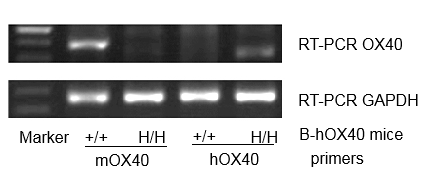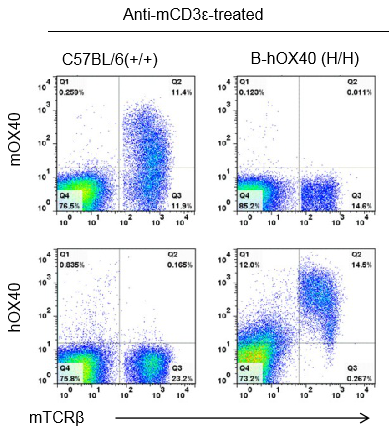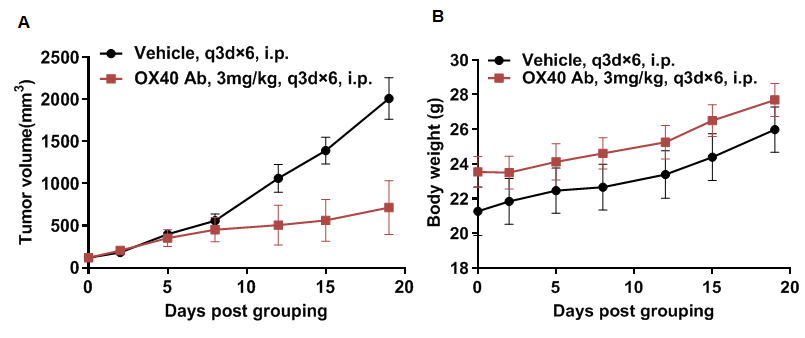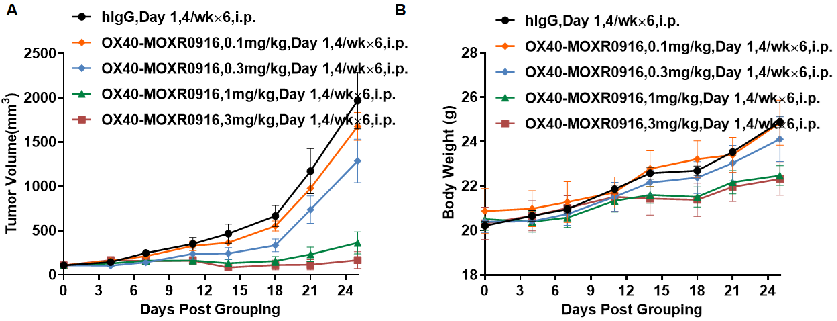| Strain Name |
C57BL/6-Tnfrsf4tm1(TNFRSF4)Bcgen/Bcgen
|
Common Name | B-hOX40 mice |
| Background | C57BL/6 | Catalog number | 110014 |
|
Related Genes |
TNFRSF4 (tumor necrosis factor receptor superfamily, member 4) | ||
|
NCBI Gene ID |
22163 |
||
mRNA expression analysis

Strain specific analysis of OX40 gene expression in WT and hOX40 mice by RT-PCR. Mouse Ox40 mRNA was detected in splenocytes of wild-type (+/+) mice. Human OX40 mRNA was detected only in homozygous B-hOX40 (H/H) mice .

Strain specific OX40 expression analysis in homozygous B-hOX40 mice by flow cytometry. Splenocytes were collected from WT and homozygous B-hOX40 (H/H) mice stimulated with anti-CD3ε in vivo (7.5 μg/mice), and analyzed by flow cytometry with species-specific anti-OX40 antibody. Mouse OX40 was exclusively detected in WT mice. Human OX40 was exclusively detected in homozygous B-hOX40 but not WT mice.

Antitumor activity of anti-human OX40 antibody in B-hOX40 mice. (A) Anti-human OX40 antibody inhibited MC38 tumor growth in B-hOX40 mice. Murine colon cancer MC38 cells (5ⅹ105) were subcutaneously implanted into homozygous B-hOX40 mice (male, 4-6 week-old, n=5). Mice were grouped when tumor volume reached approximately 100 mm3, at which time they were treated with anti-human OX40 antibody and schedules indicated in panel (B) Body weight changes during treatment. As shown in panel A, anti-human OX40 antibody was efficacious in controlling tumor growth in B-hOX40 mice, demonstrating that the B-hOX40 mice provide a powerful preclinical model for in vivo evaluation of anti-human OX40 antibodies. Values are expressed as mean ± SEM

Antitumor activity of anti-human OX40 antibody in B-hOX40 mice. (A) Anti-human OX40 antibody inhibited MC38 tumor growth in B-hOX40 mice. Murine colon cancer MC38 cells (5ⅹ105) were subcutaneously implanted into homozygous B-hOX40 mice (female, 4-6 week-old, n=6). Mice were grouped when tumor volume reached approximately 150±50 mm3, at which time they were treated with anti-human OX40 antibody with different doses and schedules indicated in panel (B) Body weight changes during treatment. As shown in panel A, anti-human OX40 antibody MOXR0916(in house) was efficacious in controlling tumor growth in B-hOX40 mice, demonstrating that the B-hOX40 mice provide a powerful preclinical model for in vivo evaluation of anti-human OX40 antibodies. Values are expressed as mean ± SEM












 京公网安备:
京公网安备: